Financial Reporting Analysis: Sainsbury Plc, IFRS, and Stakeholders
VerifiedAdded on 2020/10/23
|13
|3363
|255
Report
AI Summary
This report delves into the multifaceted world of financial reporting, examining its purpose and context, alongside the regulatory and conceptual frameworks that govern it. It analyzes the needs of key stakeholders, including managers, customers, employees, competitors, investors, and shareholders, and assesses the value of financial reporting in achieving organizational growth and objectives. The report explores international accounting standards and International Financial Reporting Standards (IFRS), evaluating their benefits and the application of relevant theories like equity and legitimacy theory. Using Sainsbury Plc as a case study, the report evaluates the degrees of compliance with IFRS across different organizations globally, highlighting the significance of financial reporting in communicating a company's overall health and facilitating informed decision-making. The analysis encompasses the differences in financial reporting practices worldwide and the factors influencing these variations.
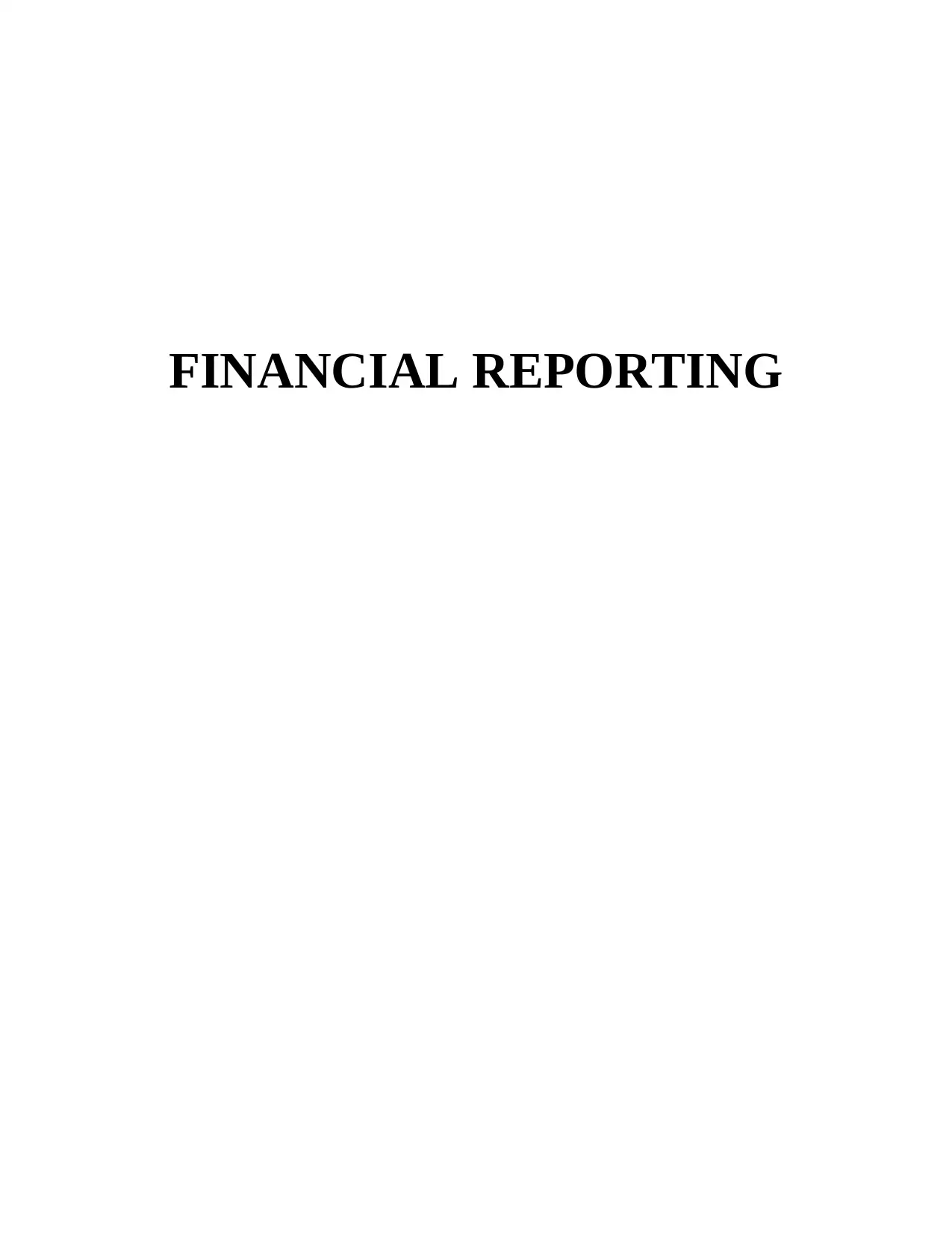
FINANCIAL REPORTING
Paraphrase This Document
Need a fresh take? Get an instant paraphrase of this document with our AI Paraphraser
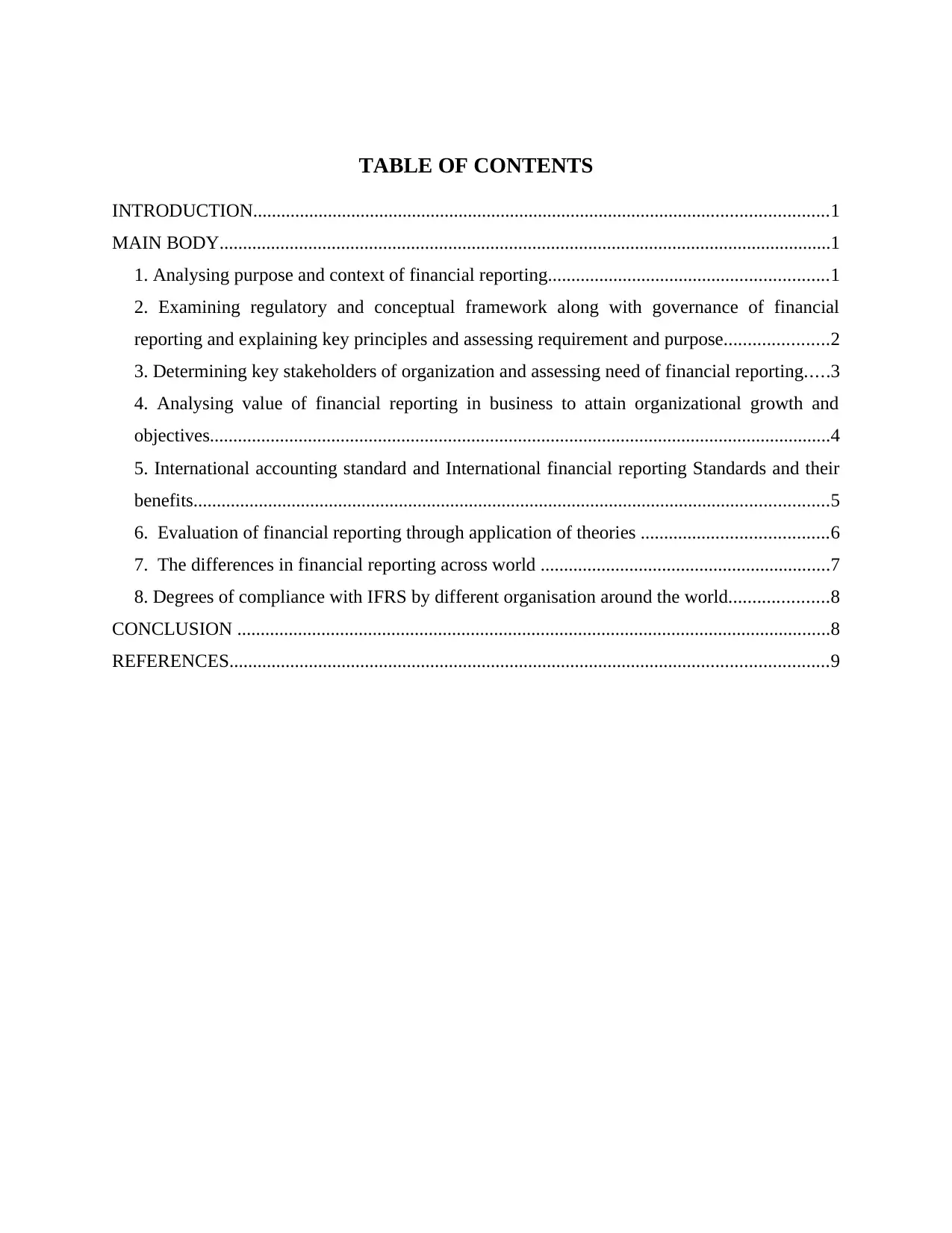
TABLE OF CONTENTS
INTRODUCTION...........................................................................................................................1
MAIN BODY...................................................................................................................................1
1. Analysing purpose and context of financial reporting............................................................1
2. Examining regulatory and conceptual framework along with governance of financial
reporting and explaining key principles and assessing requirement and purpose......................2
3. Determining key stakeholders of organization and assessing need of financial reporting.....3
4. Analysing value of financial reporting in business to attain organizational growth and
objectives.....................................................................................................................................4
5. International accounting standard and International financial reporting Standards and their
benefits........................................................................................................................................5
6. Evaluation of financial reporting through application of theories ........................................6
7. The differences in financial reporting across world ..............................................................7
8. Degrees of compliance with IFRS by different organisation around the world.....................8
CONCLUSION ...............................................................................................................................8
REFERENCES................................................................................................................................9
INTRODUCTION...........................................................................................................................1
MAIN BODY...................................................................................................................................1
1. Analysing purpose and context of financial reporting............................................................1
2. Examining regulatory and conceptual framework along with governance of financial
reporting and explaining key principles and assessing requirement and purpose......................2
3. Determining key stakeholders of organization and assessing need of financial reporting.....3
4. Analysing value of financial reporting in business to attain organizational growth and
objectives.....................................................................................................................................4
5. International accounting standard and International financial reporting Standards and their
benefits........................................................................................................................................5
6. Evaluation of financial reporting through application of theories ........................................6
7. The differences in financial reporting across world ..............................................................7
8. Degrees of compliance with IFRS by different organisation around the world.....................8
CONCLUSION ...............................................................................................................................8
REFERENCES................................................................................................................................9
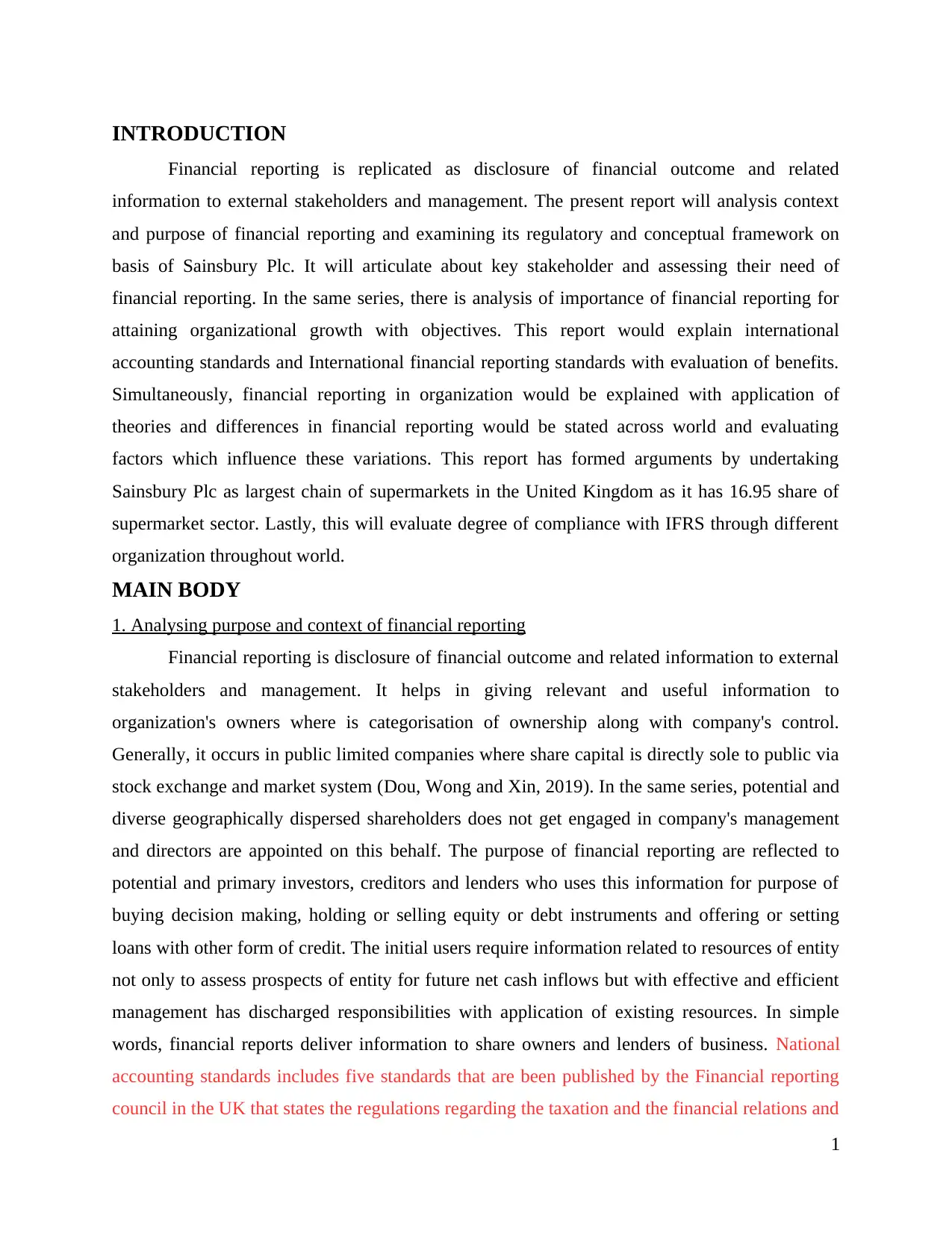
INTRODUCTION
Financial reporting is replicated as disclosure of financial outcome and related
information to external stakeholders and management. The present report will analysis context
and purpose of financial reporting and examining its regulatory and conceptual framework on
basis of Sainsbury Plc. It will articulate about key stakeholder and assessing their need of
financial reporting. In the same series, there is analysis of importance of financial reporting for
attaining organizational growth with objectives. This report would explain international
accounting standards and International financial reporting standards with evaluation of benefits.
Simultaneously, financial reporting in organization would be explained with application of
theories and differences in financial reporting would be stated across world and evaluating
factors which influence these variations. This report has formed arguments by undertaking
Sainsbury Plc as largest chain of supermarkets in the United Kingdom as it has 16.95 share of
supermarket sector. Lastly, this will evaluate degree of compliance with IFRS through different
organization throughout world.
MAIN BODY
1. Analysing purpose and context of financial reporting
Financial reporting is disclosure of financial outcome and related information to external
stakeholders and management. It helps in giving relevant and useful information to
organization's owners where is categorisation of ownership along with company's control.
Generally, it occurs in public limited companies where share capital is directly sole to public via
stock exchange and market system (Dou, Wong and Xin, 2019). In the same series, potential and
diverse geographically dispersed shareholders does not get engaged in company's management
and directors are appointed on this behalf. The purpose of financial reporting are reflected to
potential and primary investors, creditors and lenders who uses this information for purpose of
buying decision making, holding or selling equity or debt instruments and offering or setting
loans with other form of credit. The initial users require information related to resources of entity
not only to assess prospects of entity for future net cash inflows but with effective and efficient
management has discharged responsibilities with application of existing resources. In simple
words, financial reports deliver information to share owners and lenders of business. National
accounting standards includes five standards that are been published by the Financial reporting
council in the UK that states the regulations regarding the taxation and the financial relations and
1
Financial reporting is replicated as disclosure of financial outcome and related
information to external stakeholders and management. The present report will analysis context
and purpose of financial reporting and examining its regulatory and conceptual framework on
basis of Sainsbury Plc. It will articulate about key stakeholder and assessing their need of
financial reporting. In the same series, there is analysis of importance of financial reporting for
attaining organizational growth with objectives. This report would explain international
accounting standards and International financial reporting standards with evaluation of benefits.
Simultaneously, financial reporting in organization would be explained with application of
theories and differences in financial reporting would be stated across world and evaluating
factors which influence these variations. This report has formed arguments by undertaking
Sainsbury Plc as largest chain of supermarkets in the United Kingdom as it has 16.95 share of
supermarket sector. Lastly, this will evaluate degree of compliance with IFRS through different
organization throughout world.
MAIN BODY
1. Analysing purpose and context of financial reporting
Financial reporting is disclosure of financial outcome and related information to external
stakeholders and management. It helps in giving relevant and useful information to
organization's owners where is categorisation of ownership along with company's control.
Generally, it occurs in public limited companies where share capital is directly sole to public via
stock exchange and market system (Dou, Wong and Xin, 2019). In the same series, potential and
diverse geographically dispersed shareholders does not get engaged in company's management
and directors are appointed on this behalf. The purpose of financial reporting are reflected to
potential and primary investors, creditors and lenders who uses this information for purpose of
buying decision making, holding or selling equity or debt instruments and offering or setting
loans with other form of credit. The initial users require information related to resources of entity
not only to assess prospects of entity for future net cash inflows but with effective and efficient
management has discharged responsibilities with application of existing resources. In simple
words, financial reports deliver information to share owners and lenders of business. National
accounting standards includes five standards that are been published by the Financial reporting
council in the UK that states the regulations regarding the taxation and the financial relations and
1
⊘ This is a preview!⊘
Do you want full access?
Subscribe today to unlock all pages.

Trusted by 1+ million students worldwide
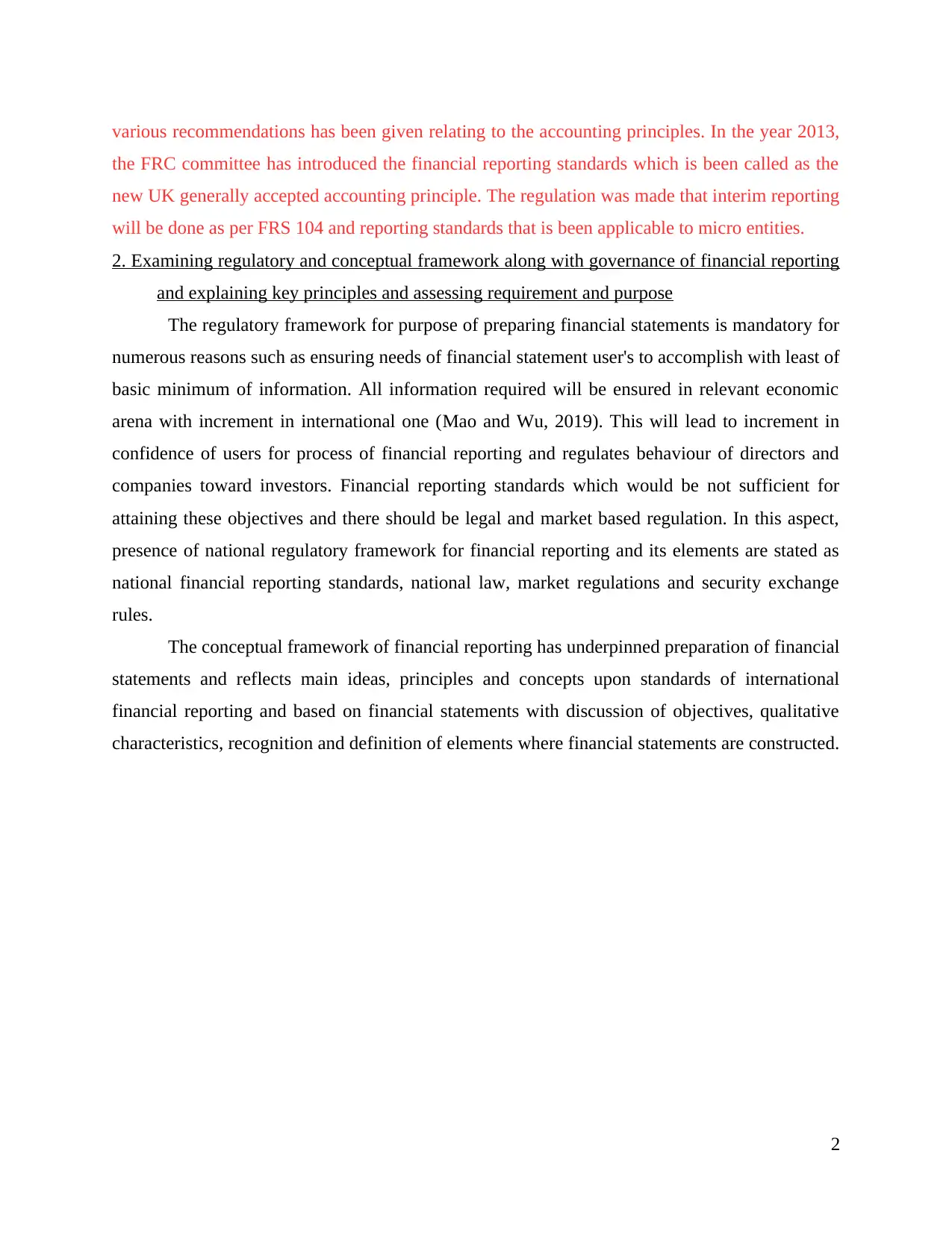
various recommendations has been given relating to the accounting principles. In the year 2013,
the FRC committee has introduced the financial reporting standards which is been called as the
new UK generally accepted accounting principle. The regulation was made that interim reporting
will be done as per FRS 104 and reporting standards that is been applicable to micro entities.
2. Examining regulatory and conceptual framework along with governance of financial reporting
and explaining key principles and assessing requirement and purpose
The regulatory framework for purpose of preparing financial statements is mandatory for
numerous reasons such as ensuring needs of financial statement user's to accomplish with least of
basic minimum of information. All information required will be ensured in relevant economic
arena with increment in international one (Mao and Wu, 2019). This will lead to increment in
confidence of users for process of financial reporting and regulates behaviour of directors and
companies toward investors. Financial reporting standards which would be not sufficient for
attaining these objectives and there should be legal and market based regulation. In this aspect,
presence of national regulatory framework for financial reporting and its elements are stated as
national financial reporting standards, national law, market regulations and security exchange
rules.
The conceptual framework of financial reporting has underpinned preparation of financial
statements and reflects main ideas, principles and concepts upon standards of international
financial reporting and based on financial statements with discussion of objectives, qualitative
characteristics, recognition and definition of elements where financial statements are constructed.
2
the FRC committee has introduced the financial reporting standards which is been called as the
new UK generally accepted accounting principle. The regulation was made that interim reporting
will be done as per FRS 104 and reporting standards that is been applicable to micro entities.
2. Examining regulatory and conceptual framework along with governance of financial reporting
and explaining key principles and assessing requirement and purpose
The regulatory framework for purpose of preparing financial statements is mandatory for
numerous reasons such as ensuring needs of financial statement user's to accomplish with least of
basic minimum of information. All information required will be ensured in relevant economic
arena with increment in international one (Mao and Wu, 2019). This will lead to increment in
confidence of users for process of financial reporting and regulates behaviour of directors and
companies toward investors. Financial reporting standards which would be not sufficient for
attaining these objectives and there should be legal and market based regulation. In this aspect,
presence of national regulatory framework for financial reporting and its elements are stated as
national financial reporting standards, national law, market regulations and security exchange
rules.
The conceptual framework of financial reporting has underpinned preparation of financial
statements and reflects main ideas, principles and concepts upon standards of international
financial reporting and based on financial statements with discussion of objectives, qualitative
characteristics, recognition and definition of elements where financial statements are constructed.
2
Paraphrase This Document
Need a fresh take? Get an instant paraphrase of this document with our AI Paraphraser
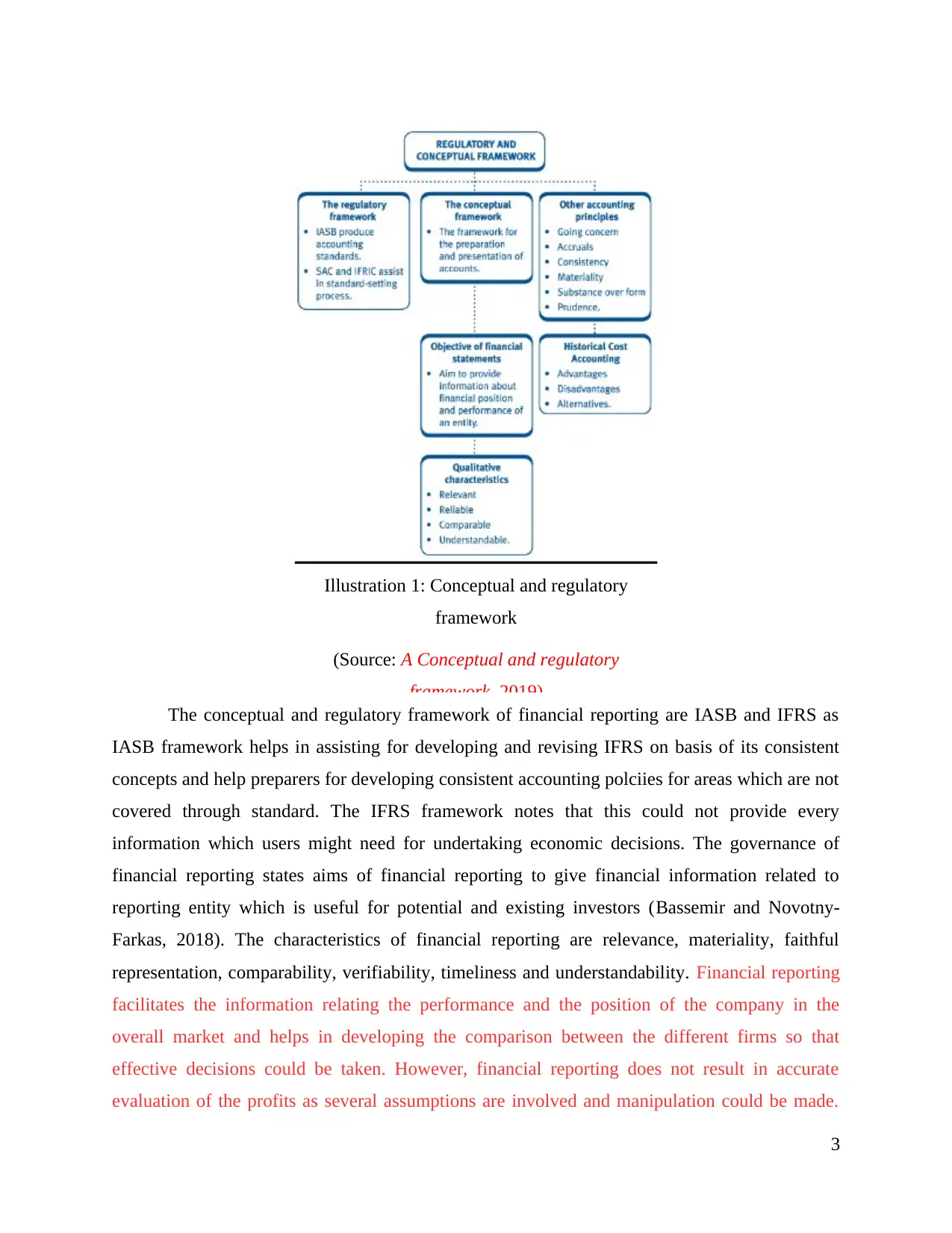
Illustration 1: Conceptual and regulatory
framework
(Source: A Conceptual and regulatory
framework, 2019)
The conceptual and regulatory framework of financial reporting are IASB and IFRS as
IASB framework helps in assisting for developing and revising IFRS on basis of its consistent
concepts and help preparers for developing consistent accounting polciies for areas which are not
covered through standard. The IFRS framework notes that this could not provide every
information which users might need for undertaking economic decisions. The governance of
financial reporting states aims of financial reporting to give financial information related to
reporting entity which is useful for potential and existing investors (Bassemir and Novotny‐
Farkas, 2018). The characteristics of financial reporting are relevance, materiality, faithful
representation, comparability, verifiability, timeliness and understandability. Financial reporting
facilitates the information relating the performance and the position of the company in the
overall market and helps in developing the comparison between the different firms so that
effective decisions could be taken. However, financial reporting does not result in accurate
evaluation of the profits as several assumptions are involved and manipulation could be made.
3
framework
(Source: A Conceptual and regulatory
framework, 2019)
The conceptual and regulatory framework of financial reporting are IASB and IFRS as
IASB framework helps in assisting for developing and revising IFRS on basis of its consistent
concepts and help preparers for developing consistent accounting polciies for areas which are not
covered through standard. The IFRS framework notes that this could not provide every
information which users might need for undertaking economic decisions. The governance of
financial reporting states aims of financial reporting to give financial information related to
reporting entity which is useful for potential and existing investors (Bassemir and Novotny‐
Farkas, 2018). The characteristics of financial reporting are relevance, materiality, faithful
representation, comparability, verifiability, timeliness and understandability. Financial reporting
facilitates the information relating the performance and the position of the company in the
overall market and helps in developing the comparison between the different firms so that
effective decisions could be taken. However, financial reporting does not result in accurate
evaluation of the profits as several assumptions are involved and manipulation could be made.
3
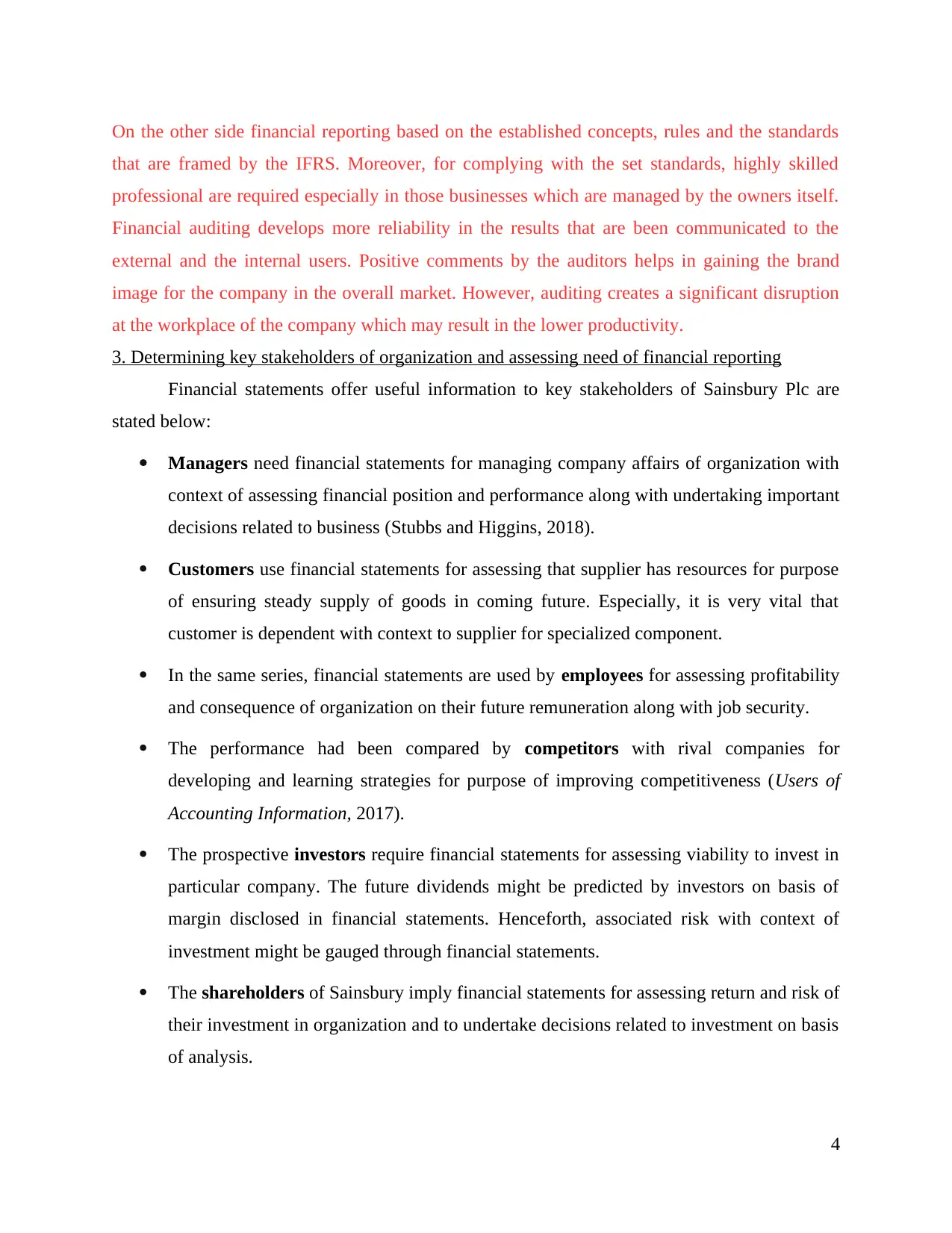
On the other side financial reporting based on the established concepts, rules and the standards
that are framed by the IFRS. Moreover, for complying with the set standards, highly skilled
professional are required especially in those businesses which are managed by the owners itself.
Financial auditing develops more reliability in the results that are been communicated to the
external and the internal users. Positive comments by the auditors helps in gaining the brand
image for the company in the overall market. However, auditing creates a significant disruption
at the workplace of the company which may result in the lower productivity.
3. Determining key stakeholders of organization and assessing need of financial reporting
Financial statements offer useful information to key stakeholders of Sainsbury Plc are
stated below:
Managers need financial statements for managing company affairs of organization with
context of assessing financial position and performance along with undertaking important
decisions related to business (Stubbs and Higgins, 2018).
Customers use financial statements for assessing that supplier has resources for purpose
of ensuring steady supply of goods in coming future. Especially, it is very vital that
customer is dependent with context to supplier for specialized component.
In the same series, financial statements are used by employees for assessing profitability
and consequence of organization on their future remuneration along with job security.
The performance had been compared by competitors with rival companies for
developing and learning strategies for purpose of improving competitiveness (Users of
Accounting Information, 2017).
The prospective investors require financial statements for assessing viability to invest in
particular company. The future dividends might be predicted by investors on basis of
margin disclosed in financial statements. Henceforth, associated risk with context of
investment might be gauged through financial statements.
The shareholders of Sainsbury imply financial statements for assessing return and risk of
their investment in organization and to undertake decisions related to investment on basis
of analysis.
4
that are framed by the IFRS. Moreover, for complying with the set standards, highly skilled
professional are required especially in those businesses which are managed by the owners itself.
Financial auditing develops more reliability in the results that are been communicated to the
external and the internal users. Positive comments by the auditors helps in gaining the brand
image for the company in the overall market. However, auditing creates a significant disruption
at the workplace of the company which may result in the lower productivity.
3. Determining key stakeholders of organization and assessing need of financial reporting
Financial statements offer useful information to key stakeholders of Sainsbury Plc are
stated below:
Managers need financial statements for managing company affairs of organization with
context of assessing financial position and performance along with undertaking important
decisions related to business (Stubbs and Higgins, 2018).
Customers use financial statements for assessing that supplier has resources for purpose
of ensuring steady supply of goods in coming future. Especially, it is very vital that
customer is dependent with context to supplier for specialized component.
In the same series, financial statements are used by employees for assessing profitability
and consequence of organization on their future remuneration along with job security.
The performance had been compared by competitors with rival companies for
developing and learning strategies for purpose of improving competitiveness (Users of
Accounting Information, 2017).
The prospective investors require financial statements for assessing viability to invest in
particular company. The future dividends might be predicted by investors on basis of
margin disclosed in financial statements. Henceforth, associated risk with context of
investment might be gauged through financial statements.
The shareholders of Sainsbury imply financial statements for assessing return and risk of
their investment in organization and to undertake decisions related to investment on basis
of analysis.
4
⊘ This is a preview!⊘
Do you want full access?
Subscribe today to unlock all pages.

Trusted by 1+ million students worldwide
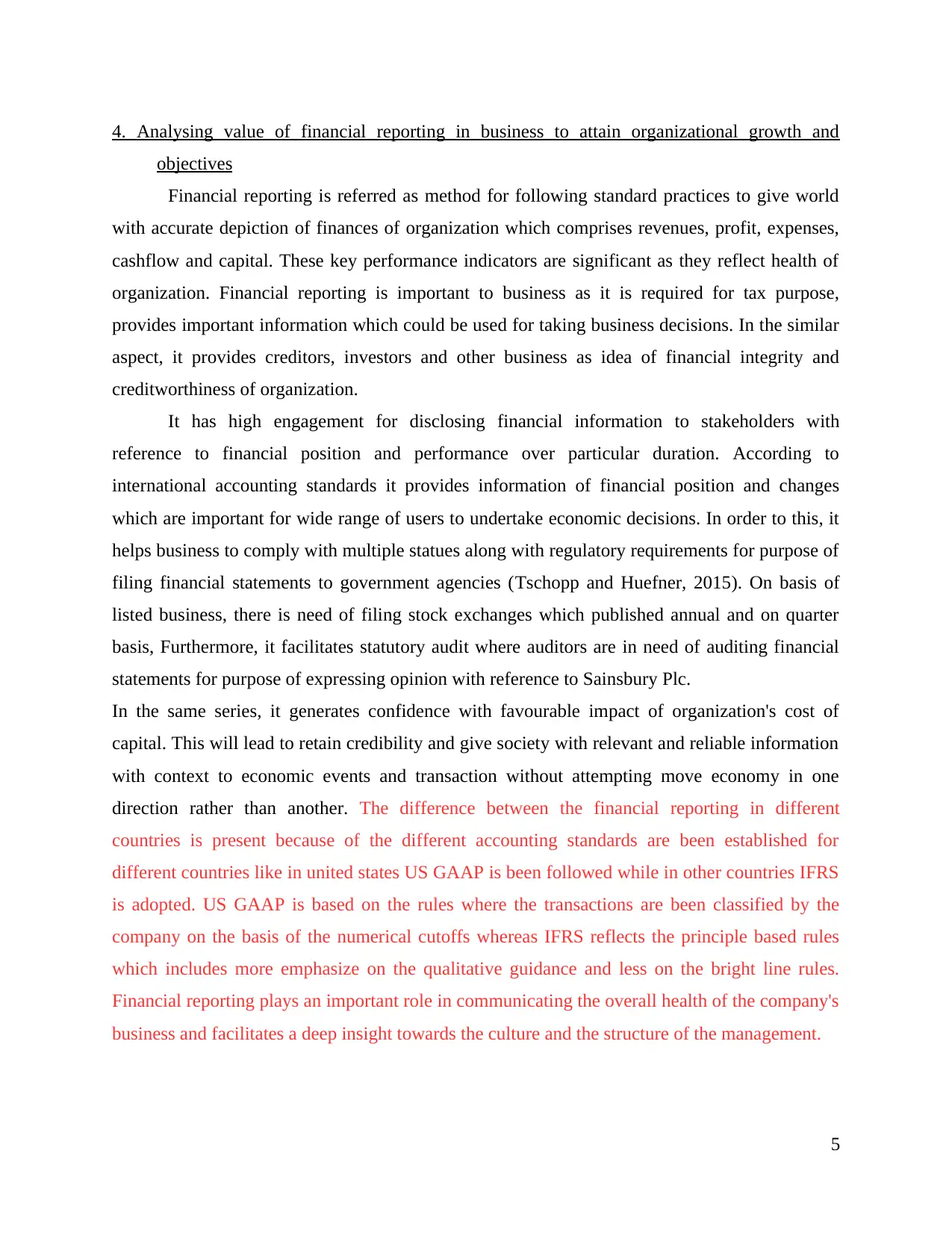
4. Analysing value of financial reporting in business to attain organizational growth and
objectives
Financial reporting is referred as method for following standard practices to give world
with accurate depiction of finances of organization which comprises revenues, profit, expenses,
cashflow and capital. These key performance indicators are significant as they reflect health of
organization. Financial reporting is important to business as it is required for tax purpose,
provides important information which could be used for taking business decisions. In the similar
aspect, it provides creditors, investors and other business as idea of financial integrity and
creditworthiness of organization.
It has high engagement for disclosing financial information to stakeholders with
reference to financial position and performance over particular duration. According to
international accounting standards it provides information of financial position and changes
which are important for wide range of users to undertake economic decisions. In order to this, it
helps business to comply with multiple statues along with regulatory requirements for purpose of
filing financial statements to government agencies (Tschopp and Huefner, 2015). On basis of
listed business, there is need of filing stock exchanges which published annual and on quarter
basis, Furthermore, it facilitates statutory audit where auditors are in need of auditing financial
statements for purpose of expressing opinion with reference to Sainsbury Plc.
In the same series, it generates confidence with favourable impact of organization's cost of
capital. This will lead to retain credibility and give society with relevant and reliable information
with context to economic events and transaction without attempting move economy in one
direction rather than another. The difference between the financial reporting in different
countries is present because of the different accounting standards are been established for
different countries like in united states US GAAP is been followed while in other countries IFRS
is adopted. US GAAP is based on the rules where the transactions are been classified by the
company on the basis of the numerical cutoffs whereas IFRS reflects the principle based rules
which includes more emphasize on the qualitative guidance and less on the bright line rules.
Financial reporting plays an important role in communicating the overall health of the company's
business and facilitates a deep insight towards the culture and the structure of the management.
5
objectives
Financial reporting is referred as method for following standard practices to give world
with accurate depiction of finances of organization which comprises revenues, profit, expenses,
cashflow and capital. These key performance indicators are significant as they reflect health of
organization. Financial reporting is important to business as it is required for tax purpose,
provides important information which could be used for taking business decisions. In the similar
aspect, it provides creditors, investors and other business as idea of financial integrity and
creditworthiness of organization.
It has high engagement for disclosing financial information to stakeholders with
reference to financial position and performance over particular duration. According to
international accounting standards it provides information of financial position and changes
which are important for wide range of users to undertake economic decisions. In order to this, it
helps business to comply with multiple statues along with regulatory requirements for purpose of
filing financial statements to government agencies (Tschopp and Huefner, 2015). On basis of
listed business, there is need of filing stock exchanges which published annual and on quarter
basis, Furthermore, it facilitates statutory audit where auditors are in need of auditing financial
statements for purpose of expressing opinion with reference to Sainsbury Plc.
In the same series, it generates confidence with favourable impact of organization's cost of
capital. This will lead to retain credibility and give society with relevant and reliable information
with context to economic events and transaction without attempting move economy in one
direction rather than another. The difference between the financial reporting in different
countries is present because of the different accounting standards are been established for
different countries like in united states US GAAP is been followed while in other countries IFRS
is adopted. US GAAP is based on the rules where the transactions are been classified by the
company on the basis of the numerical cutoffs whereas IFRS reflects the principle based rules
which includes more emphasize on the qualitative guidance and less on the bright line rules.
Financial reporting plays an important role in communicating the overall health of the company's
business and facilitates a deep insight towards the culture and the structure of the management.
5
Paraphrase This Document
Need a fresh take? Get an instant paraphrase of this document with our AI Paraphraser
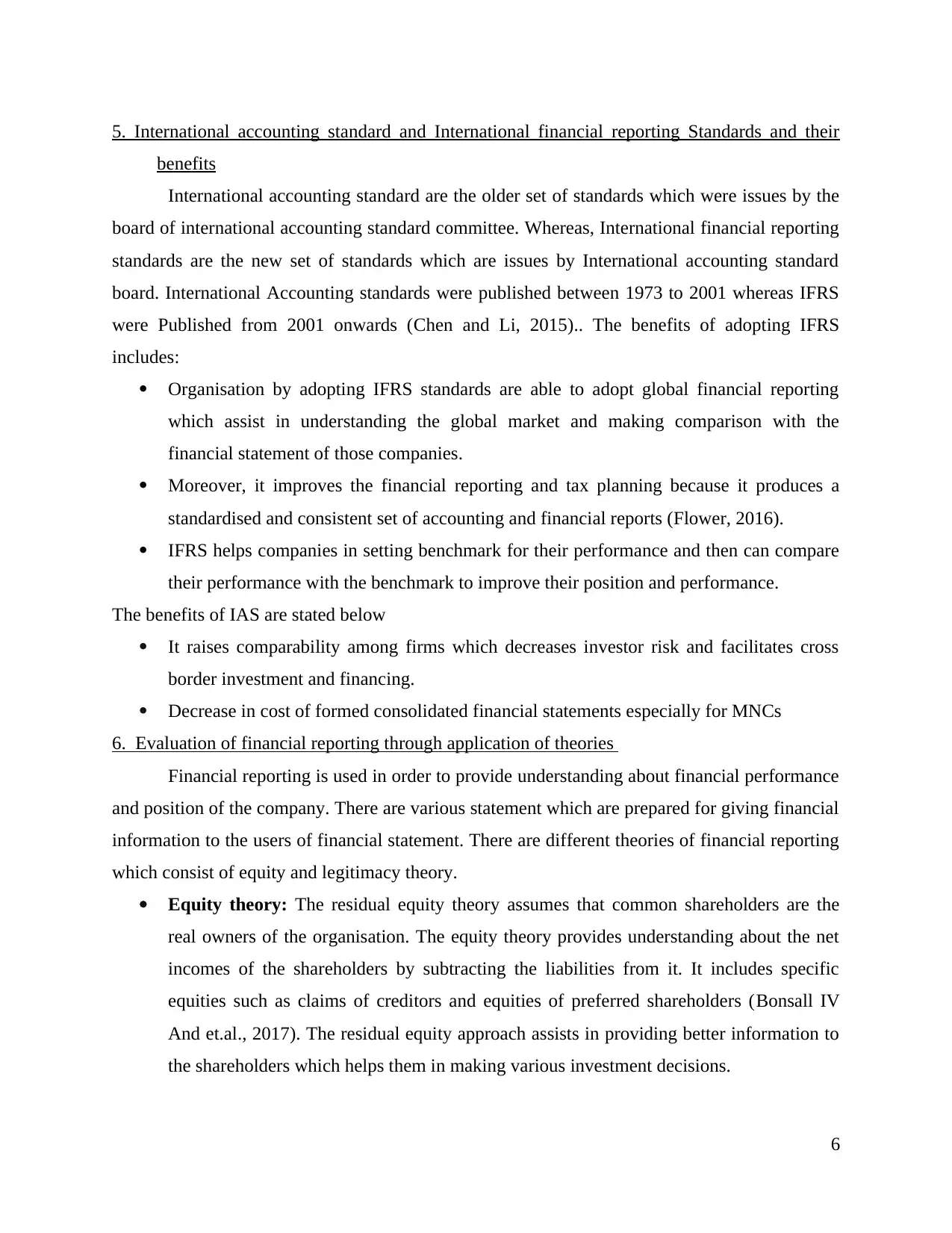
5. International accounting standard and International financial reporting Standards and their
benefits
International accounting standard are the older set of standards which were issues by the
board of international accounting standard committee. Whereas, International financial reporting
standards are the new set of standards which are issues by International accounting standard
board. International Accounting standards were published between 1973 to 2001 whereas IFRS
were Published from 2001 onwards (Chen and Li, 2015).. The benefits of adopting IFRS
includes:
Organisation by adopting IFRS standards are able to adopt global financial reporting
which assist in understanding the global market and making comparison with the
financial statement of those companies.
Moreover, it improves the financial reporting and tax planning because it produces a
standardised and consistent set of accounting and financial reports (Flower, 2016).
IFRS helps companies in setting benchmark for their performance and then can compare
their performance with the benchmark to improve their position and performance.
The benefits of IAS are stated below
It raises comparability among firms which decreases investor risk and facilitates cross
border investment and financing.
Decrease in cost of formed consolidated financial statements especially for MNCs
6. Evaluation of financial reporting through application of theories
Financial reporting is used in order to provide understanding about financial performance
and position of the company. There are various statement which are prepared for giving financial
information to the users of financial statement. There are different theories of financial reporting
which consist of equity and legitimacy theory.
Equity theory: The residual equity theory assumes that common shareholders are the
real owners of the organisation. The equity theory provides understanding about the net
incomes of the shareholders by subtracting the liabilities from it. It includes specific
equities such as claims of creditors and equities of preferred shareholders (Bonsall IV
And et.al., 2017). The residual equity approach assists in providing better information to
the shareholders which helps them in making various investment decisions.
6
benefits
International accounting standard are the older set of standards which were issues by the
board of international accounting standard committee. Whereas, International financial reporting
standards are the new set of standards which are issues by International accounting standard
board. International Accounting standards were published between 1973 to 2001 whereas IFRS
were Published from 2001 onwards (Chen and Li, 2015).. The benefits of adopting IFRS
includes:
Organisation by adopting IFRS standards are able to adopt global financial reporting
which assist in understanding the global market and making comparison with the
financial statement of those companies.
Moreover, it improves the financial reporting and tax planning because it produces a
standardised and consistent set of accounting and financial reports (Flower, 2016).
IFRS helps companies in setting benchmark for their performance and then can compare
their performance with the benchmark to improve their position and performance.
The benefits of IAS are stated below
It raises comparability among firms which decreases investor risk and facilitates cross
border investment and financing.
Decrease in cost of formed consolidated financial statements especially for MNCs
6. Evaluation of financial reporting through application of theories
Financial reporting is used in order to provide understanding about financial performance
and position of the company. There are various statement which are prepared for giving financial
information to the users of financial statement. There are different theories of financial reporting
which consist of equity and legitimacy theory.
Equity theory: The residual equity theory assumes that common shareholders are the
real owners of the organisation. The equity theory provides understanding about the net
incomes of the shareholders by subtracting the liabilities from it. It includes specific
equities such as claims of creditors and equities of preferred shareholders (Bonsall IV
And et.al., 2017). The residual equity approach assists in providing better information to
the shareholders which helps them in making various investment decisions.
6
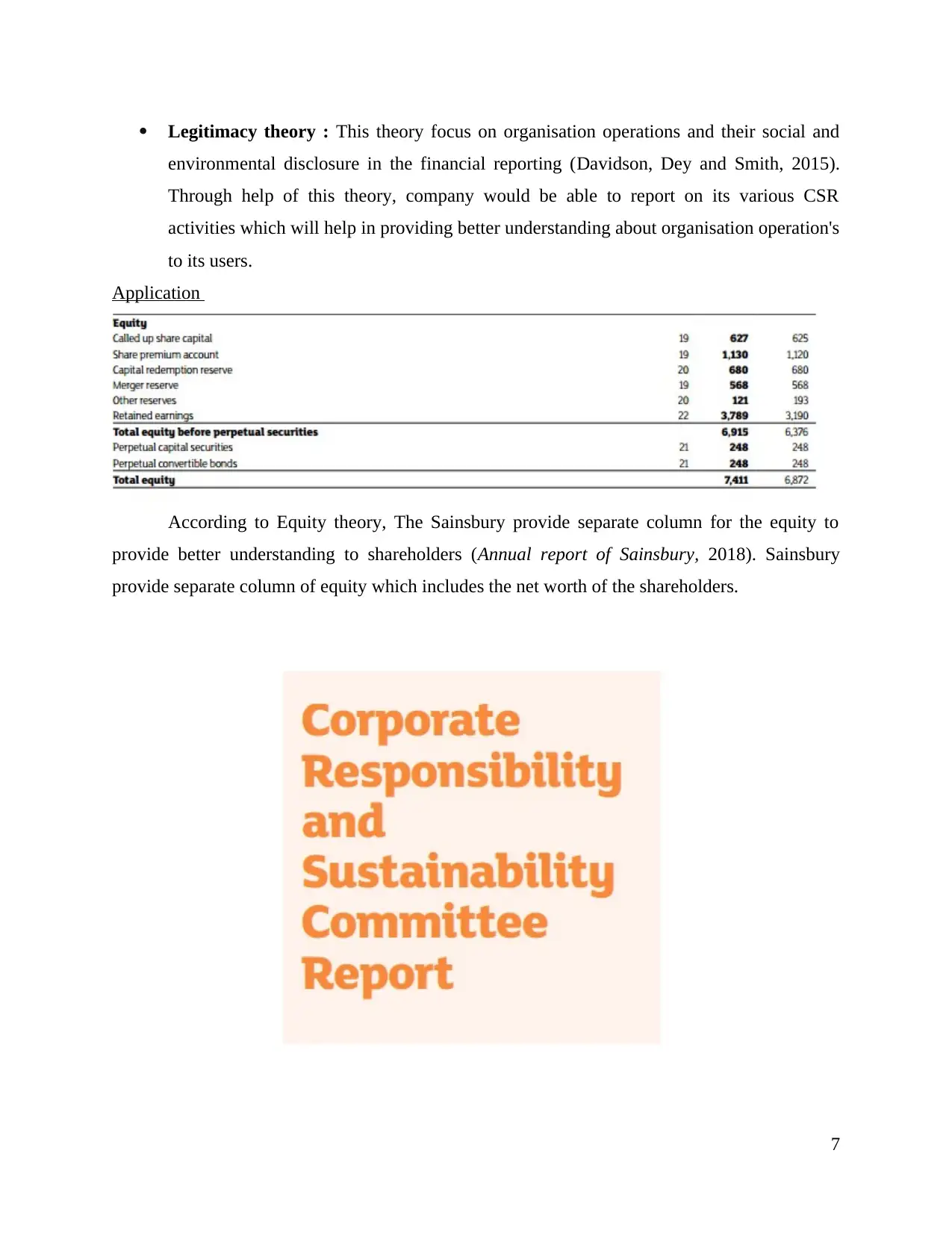
Legitimacy theory : This theory focus on organisation operations and their social and
environmental disclosure in the financial reporting (Davidson, Dey and Smith, 2015).
Through help of this theory, company would be able to report on its various CSR
activities which will help in providing better understanding about organisation operation's
to its users.
Application
According to Equity theory, The Sainsbury provide separate column for the equity to
provide better understanding to shareholders (Annual report of Sainsbury, 2018). Sainsbury
provide separate column of equity which includes the net worth of the shareholders.
7
environmental disclosure in the financial reporting (Davidson, Dey and Smith, 2015).
Through help of this theory, company would be able to report on its various CSR
activities which will help in providing better understanding about organisation operation's
to its users.
Application
According to Equity theory, The Sainsbury provide separate column for the equity to
provide better understanding to shareholders (Annual report of Sainsbury, 2018). Sainsbury
provide separate column of equity which includes the net worth of the shareholders.
7
⊘ This is a preview!⊘
Do you want full access?
Subscribe today to unlock all pages.

Trusted by 1+ million students worldwide
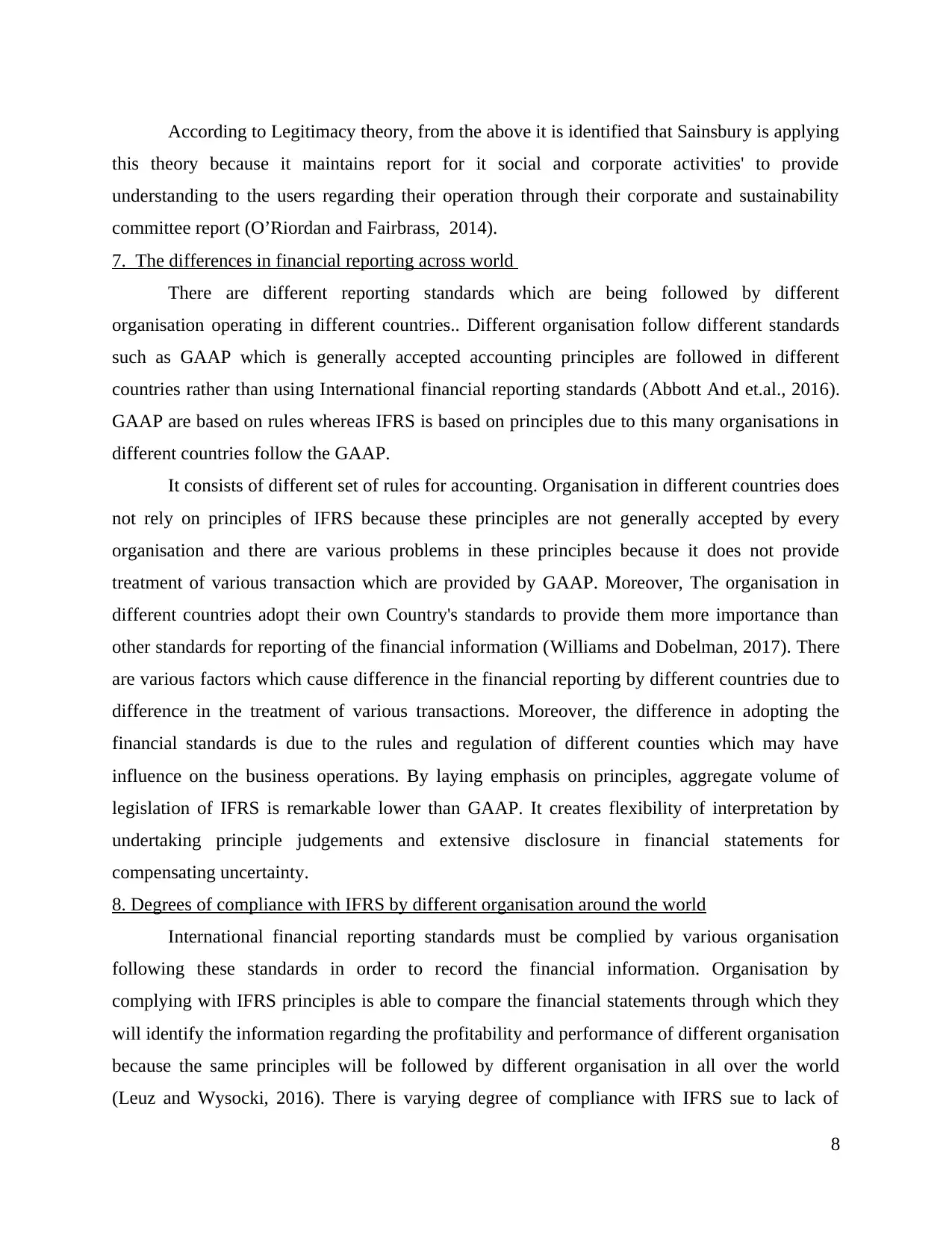
According to Legitimacy theory, from the above it is identified that Sainsbury is applying
this theory because it maintains report for it social and corporate activities' to provide
understanding to the users regarding their operation through their corporate and sustainability
committee report (O’Riordan and Fairbrass, 2014).
7. The differences in financial reporting across world
There are different reporting standards which are being followed by different
organisation operating in different countries.. Different organisation follow different standards
such as GAAP which is generally accepted accounting principles are followed in different
countries rather than using International financial reporting standards (Abbott And et.al., 2016).
GAAP are based on rules whereas IFRS is based on principles due to this many organisations in
different countries follow the GAAP.
It consists of different set of rules for accounting. Organisation in different countries does
not rely on principles of IFRS because these principles are not generally accepted by every
organisation and there are various problems in these principles because it does not provide
treatment of various transaction which are provided by GAAP. Moreover, The organisation in
different countries adopt their own Country's standards to provide them more importance than
other standards for reporting of the financial information (Williams and Dobelman, 2017). There
are various factors which cause difference in the financial reporting by different countries due to
difference in the treatment of various transactions. Moreover, the difference in adopting the
financial standards is due to the rules and regulation of different counties which may have
influence on the business operations. By laying emphasis on principles, aggregate volume of
legislation of IFRS is remarkable lower than GAAP. It creates flexibility of interpretation by
undertaking principle judgements and extensive disclosure in financial statements for
compensating uncertainty.
8. Degrees of compliance with IFRS by different organisation around the world
International financial reporting standards must be complied by various organisation
following these standards in order to record the financial information. Organisation by
complying with IFRS principles is able to compare the financial statements through which they
will identify the information regarding the profitability and performance of different organisation
because the same principles will be followed by different organisation in all over the world
(Leuz and Wysocki, 2016). There is varying degree of compliance with IFRS sue to lack of
8
this theory because it maintains report for it social and corporate activities' to provide
understanding to the users regarding their operation through their corporate and sustainability
committee report (O’Riordan and Fairbrass, 2014).
7. The differences in financial reporting across world
There are different reporting standards which are being followed by different
organisation operating in different countries.. Different organisation follow different standards
such as GAAP which is generally accepted accounting principles are followed in different
countries rather than using International financial reporting standards (Abbott And et.al., 2016).
GAAP are based on rules whereas IFRS is based on principles due to this many organisations in
different countries follow the GAAP.
It consists of different set of rules for accounting. Organisation in different countries does
not rely on principles of IFRS because these principles are not generally accepted by every
organisation and there are various problems in these principles because it does not provide
treatment of various transaction which are provided by GAAP. Moreover, The organisation in
different countries adopt their own Country's standards to provide them more importance than
other standards for reporting of the financial information (Williams and Dobelman, 2017). There
are various factors which cause difference in the financial reporting by different countries due to
difference in the treatment of various transactions. Moreover, the difference in adopting the
financial standards is due to the rules and regulation of different counties which may have
influence on the business operations. By laying emphasis on principles, aggregate volume of
legislation of IFRS is remarkable lower than GAAP. It creates flexibility of interpretation by
undertaking principle judgements and extensive disclosure in financial statements for
compensating uncertainty.
8. Degrees of compliance with IFRS by different organisation around the world
International financial reporting standards must be complied by various organisation
following these standards in order to record the financial information. Organisation by
complying with IFRS principles is able to compare the financial statements through which they
will identify the information regarding the profitability and performance of different organisation
because the same principles will be followed by different organisation in all over the world
(Leuz and Wysocki, 2016). There is varying degree of compliance with IFRS sue to lack of
8
Paraphrase This Document
Need a fresh take? Get an instant paraphrase of this document with our AI Paraphraser
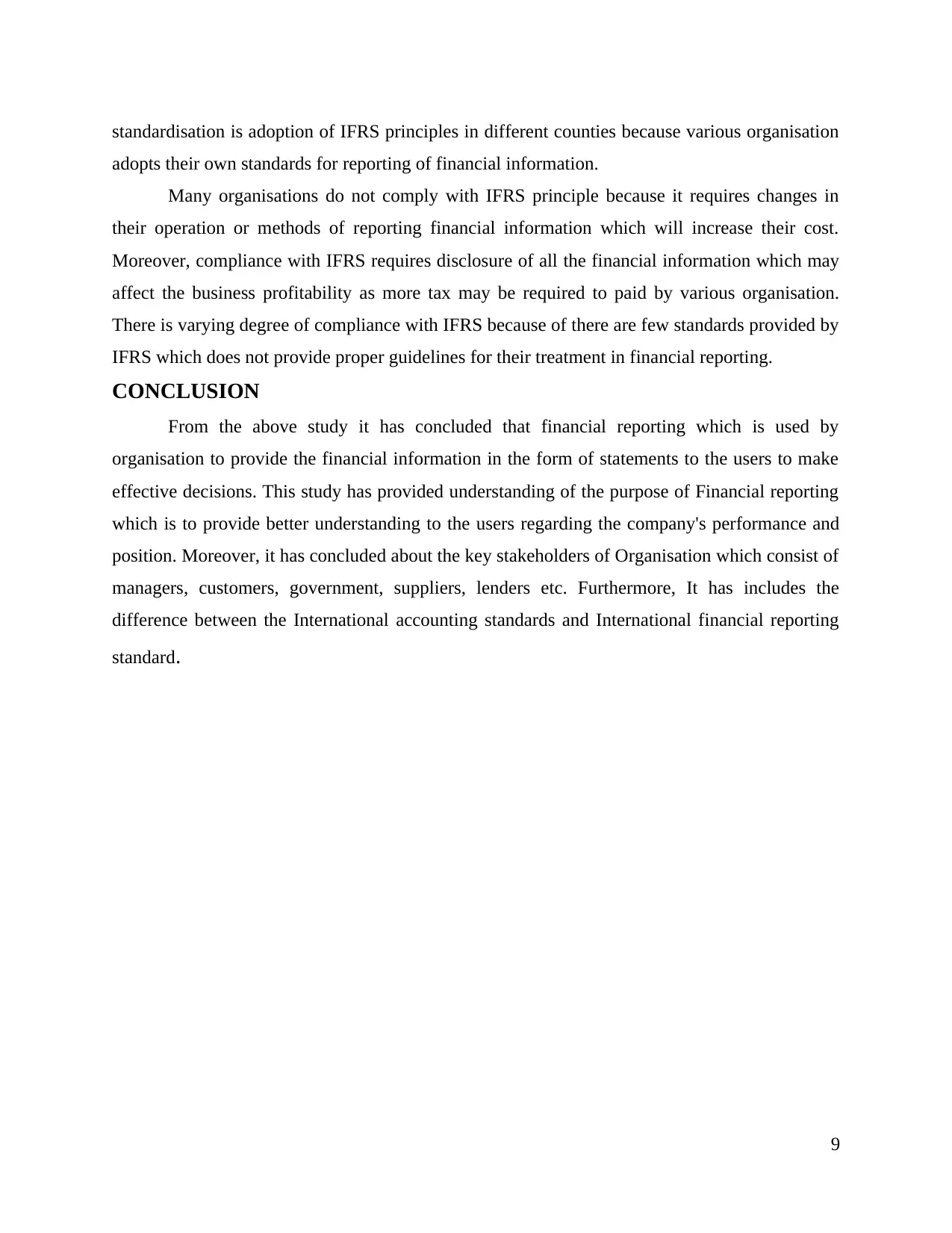
standardisation is adoption of IFRS principles in different counties because various organisation
adopts their own standards for reporting of financial information.
Many organisations do not comply with IFRS principle because it requires changes in
their operation or methods of reporting financial information which will increase their cost.
Moreover, compliance with IFRS requires disclosure of all the financial information which may
affect the business profitability as more tax may be required to paid by various organisation.
There is varying degree of compliance with IFRS because of there are few standards provided by
IFRS which does not provide proper guidelines for their treatment in financial reporting.
CONCLUSION
From the above study it has concluded that financial reporting which is used by
organisation to provide the financial information in the form of statements to the users to make
effective decisions. This study has provided understanding of the purpose of Financial reporting
which is to provide better understanding to the users regarding the company's performance and
position. Moreover, it has concluded about the key stakeholders of Organisation which consist of
managers, customers, government, suppliers, lenders etc. Furthermore, It has includes the
difference between the International accounting standards and International financial reporting
standard.
9
adopts their own standards for reporting of financial information.
Many organisations do not comply with IFRS principle because it requires changes in
their operation or methods of reporting financial information which will increase their cost.
Moreover, compliance with IFRS requires disclosure of all the financial information which may
affect the business profitability as more tax may be required to paid by various organisation.
There is varying degree of compliance with IFRS because of there are few standards provided by
IFRS which does not provide proper guidelines for their treatment in financial reporting.
CONCLUSION
From the above study it has concluded that financial reporting which is used by
organisation to provide the financial information in the form of statements to the users to make
effective decisions. This study has provided understanding of the purpose of Financial reporting
which is to provide better understanding to the users regarding the company's performance and
position. Moreover, it has concluded about the key stakeholders of Organisation which consist of
managers, customers, government, suppliers, lenders etc. Furthermore, It has includes the
difference between the International accounting standards and International financial reporting
standard.
9
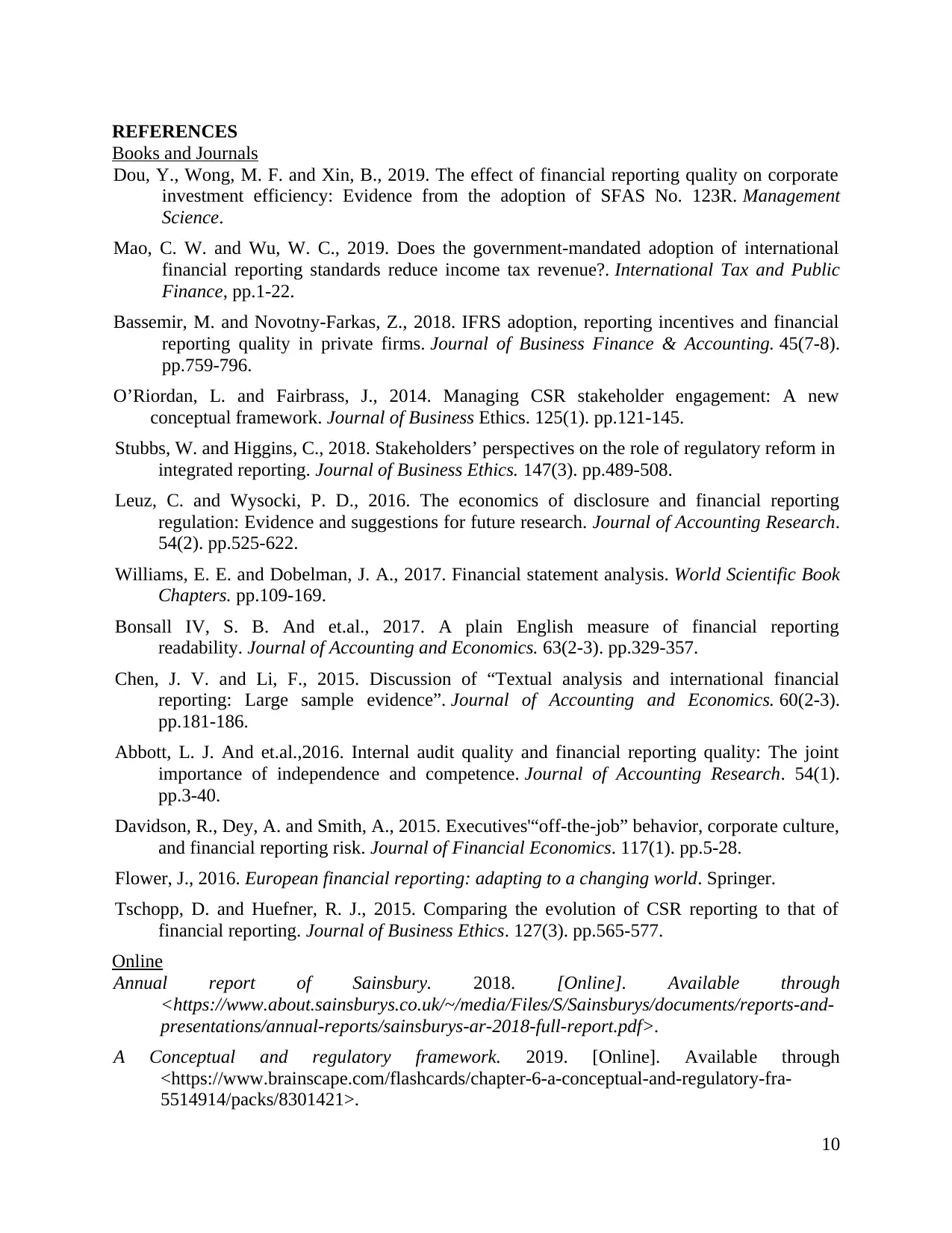
REFERENCES
Books and Journals
Dou, Y., Wong, M. F. and Xin, B., 2019. The effect of financial reporting quality on corporate
investment efficiency: Evidence from the adoption of SFAS No. 123R. Management
Science.
Mao, C. W. and Wu, W. C., 2019. Does the government-mandated adoption of international
financial reporting standards reduce income tax revenue?. International Tax and Public
Finance, pp.1-22.
Bassemir, M. and Novotny‐Farkas, Z., 2018. IFRS adoption, reporting incentives and financial
reporting quality in private firms. Journal of Business Finance & Accounting. 45(7-8).
pp.759-796.
O’Riordan, L. and Fairbrass, J., 2014. Managing CSR stakeholder engagement: A new
conceptual framework. Journal of Business Ethics. 125(1). pp.121-145.
Stubbs, W. and Higgins, C., 2018. Stakeholders’ perspectives on the role of regulatory reform in
integrated reporting. Journal of Business Ethics. 147(3). pp.489-508.
Leuz, C. and Wysocki, P. D., 2016. The economics of disclosure and financial reporting
regulation: Evidence and suggestions for future research. Journal of Accounting Research.
54(2). pp.525-622.
Williams, E. E. and Dobelman, J. A., 2017. Financial statement analysis. World Scientific Book
Chapters. pp.109-169.
Bonsall IV, S. B. And et.al., 2017. A plain English measure of financial reporting
readability. Journal of Accounting and Economics. 63(2-3). pp.329-357.
Chen, J. V. and Li, F., 2015. Discussion of “Textual analysis and international financial
reporting: Large sample evidence”. Journal of Accounting and Economics. 60(2-3).
pp.181-186.
Abbott, L. J. And et.al.,2016. Internal audit quality and financial reporting quality: The joint
importance of independence and competence. Journal of Accounting Research. 54(1).
pp.3-40.
Davidson, R., Dey, A. and Smith, A., 2015. Executives'“off-the-job” behavior, corporate culture,
and financial reporting risk. Journal of Financial Economics. 117(1). pp.5-28.
Flower, J., 2016. European financial reporting: adapting to a changing world. Springer.
Tschopp, D. and Huefner, R. J., 2015. Comparing the evolution of CSR reporting to that of
financial reporting. Journal of Business Ethics. 127(3). pp.565-577.
Online
Annual report of Sainsbury. 2018. [Online]. Available through
<https://www.about.sainsburys.co.uk/~/media/Files/S/Sainsburys/documents/reports-and-
presentations/annual-reports/sainsburys-ar-2018-full-report.pdf>.
A Conceptual and regulatory framework. 2019. [Online]. Available through
<https://www.brainscape.com/flashcards/chapter-6-a-conceptual-and-regulatory-fra-
5514914/packs/8301421>.
10
Books and Journals
Dou, Y., Wong, M. F. and Xin, B., 2019. The effect of financial reporting quality on corporate
investment efficiency: Evidence from the adoption of SFAS No. 123R. Management
Science.
Mao, C. W. and Wu, W. C., 2019. Does the government-mandated adoption of international
financial reporting standards reduce income tax revenue?. International Tax and Public
Finance, pp.1-22.
Bassemir, M. and Novotny‐Farkas, Z., 2018. IFRS adoption, reporting incentives and financial
reporting quality in private firms. Journal of Business Finance & Accounting. 45(7-8).
pp.759-796.
O’Riordan, L. and Fairbrass, J., 2014. Managing CSR stakeholder engagement: A new
conceptual framework. Journal of Business Ethics. 125(1). pp.121-145.
Stubbs, W. and Higgins, C., 2018. Stakeholders’ perspectives on the role of regulatory reform in
integrated reporting. Journal of Business Ethics. 147(3). pp.489-508.
Leuz, C. and Wysocki, P. D., 2016. The economics of disclosure and financial reporting
regulation: Evidence and suggestions for future research. Journal of Accounting Research.
54(2). pp.525-622.
Williams, E. E. and Dobelman, J. A., 2017. Financial statement analysis. World Scientific Book
Chapters. pp.109-169.
Bonsall IV, S. B. And et.al., 2017. A plain English measure of financial reporting
readability. Journal of Accounting and Economics. 63(2-3). pp.329-357.
Chen, J. V. and Li, F., 2015. Discussion of “Textual analysis and international financial
reporting: Large sample evidence”. Journal of Accounting and Economics. 60(2-3).
pp.181-186.
Abbott, L. J. And et.al.,2016. Internal audit quality and financial reporting quality: The joint
importance of independence and competence. Journal of Accounting Research. 54(1).
pp.3-40.
Davidson, R., Dey, A. and Smith, A., 2015. Executives'“off-the-job” behavior, corporate culture,
and financial reporting risk. Journal of Financial Economics. 117(1). pp.5-28.
Flower, J., 2016. European financial reporting: adapting to a changing world. Springer.
Tschopp, D. and Huefner, R. J., 2015. Comparing the evolution of CSR reporting to that of
financial reporting. Journal of Business Ethics. 127(3). pp.565-577.
Online
Annual report of Sainsbury. 2018. [Online]. Available through
<https://www.about.sainsburys.co.uk/~/media/Files/S/Sainsburys/documents/reports-and-
presentations/annual-reports/sainsburys-ar-2018-full-report.pdf>.
A Conceptual and regulatory framework. 2019. [Online]. Available through
<https://www.brainscape.com/flashcards/chapter-6-a-conceptual-and-regulatory-fra-
5514914/packs/8301421>.
10
⊘ This is a preview!⊘
Do you want full access?
Subscribe today to unlock all pages.

Trusted by 1+ million students worldwide
1 out of 13
Related Documents
Your All-in-One AI-Powered Toolkit for Academic Success.
+13062052269
info@desklib.com
Available 24*7 on WhatsApp / Email
![[object Object]](/_next/static/media/star-bottom.7253800d.svg)
Unlock your academic potential
Copyright © 2020–2025 A2Z Services. All Rights Reserved. Developed and managed by ZUCOL.





